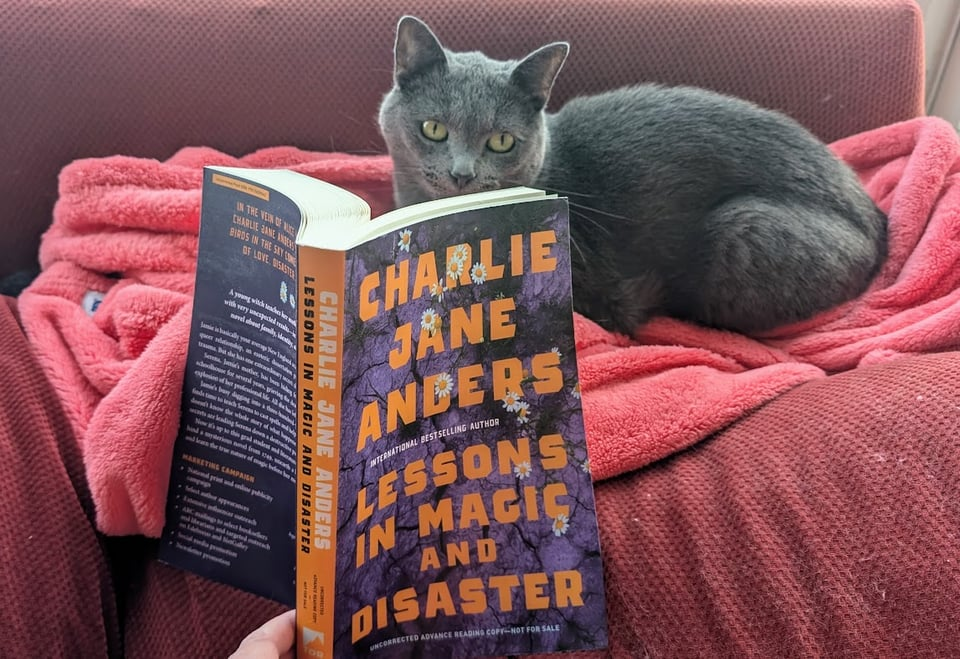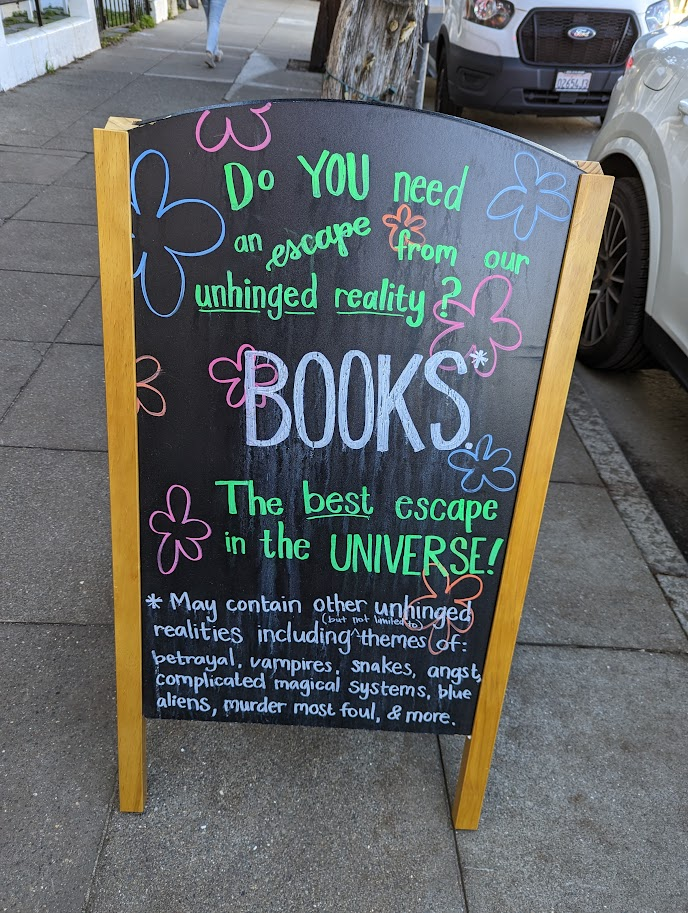Pre-Ordering Books Makes You More of a Citizen of Literature
Recently on Bluesky, I was shouting as usual about Lessons in Magic and Disaster, my novel that comes out in about a month. (It's about a young trans woman who teaches her depressed mother how to do magic, and it is full of queer joy, weirdness, complicated family stuff, unconditional love, and tenderness.) In response to my promotional warbling, somebody said they wished they could find a way to let their local indie bookstore know right now that they wanted a copy of this book reserved for them. So I had the extreme pleasure and delight of introducing someone to the concept of pre-orders, at which point they were as delighted as I was.
So I figured it wouldn't be a bad idea to write a whole newsletter about why pre-orders are so important, and why authors need them so much.

There are two basic cases for pre-orders: a positive one and a negative one. I prefer to emphasize the first over the second, but they both are extremely true and valid.
The positive case for pre-orders goes like this: they're a gift that you are buying for your future self. You are surprising this upcoming incarnation with a nice treat, one that you may or may not remember having ordered by the time it shows up. You are showing a lot of love to the book you're pre-ordering and the bookstore you are pre-ordering it from. You are letting the bookstore know that this is a book that you — and possibly others — are already excited about.
Pre-ordering is inherently a hopeful, forward-looking action that declares that we will survive, and there will be wonderful books for us to read when we do. With pre-orders, you get a lot of bang for your buck, because all those months of pre-sales add up as part of the first week's purchases of a book — meaning that a book with a lot of pre-orders will show a stronger opening week. This, in turn, signals to everybody that this is a book that is going places.
The more negative case is a bit of a bummer, and I apologize in advance for bringing the mood down.
Basically, it's harder and harder for new books, even ones by established authors, to get much traction in the marketplace. There are so many books out every week, and the tech industry has systematically destroyed all of the ways that we used to find out about new books. We're basically left with Tiktok at this point. Bookstores seem to be ordering more conservatively than before the pandemic, and keeping books on their shelves for less time. Although the occasional book gets a ton of attention years after it was published, in practice most books have a shorter and shorter window in which to get noticed, before they start to disappear.
There is a reason why so many authors on social media seem increasingly freaked out. It's an alarming time for so many of us. In fact, authors are caught at the epicenter of (deep breath) the death of arts journalism, the rise of book bans, "A.I." snake-oil hucksterism, and a number of other shit-tastic trends. Art and culture are being sabotaged as part of a program of dehumanization. I also get a strong sense that we are enjoying a wealth of wonderful queer books right now, including wonderful trans books — because these books were greenlit a few years ago, in a very different moment. And in many cases these queer and trans books are not getting enough love in the marketplace, because of how things have changed in the last few years.

Okay, that's the end of the negative case for pre-orders. Phew.
In a moment, I'm going to talk about how a culture of pre-ordering can be part of a larger sense of active participation, or even citizenship, in the book world on the part of everybody who loves books. But first, I should walk you through how pre-ordering works.
(Let's take a moment to thank our lucky stars that I'm not talking about comics, in which case I'd have to tell you about "final order cut off dates," and having to wait until things have been listed in Previews, which would basically drive you to "gazing into non-Euclidean eldritch horror" levels of brainsplat.)
Basically, if you want to pre-order a book, there are a few ways to do it. You can physically go to your local bookstore and ask them to reserve a copy of, to choose a random example, Lessons in Magic and Disaster. The bookseller will enter it into their system as an order or make a note somewhere. Many bookstores also have their own bespoke e-commerce situations, allowing you to place an order through their website — and this will usually include books that are not yet available. In practice, this could be the same as ordering a book that is already out. (During the pandemic lockdown, when I could not physically visit book stores, I did pre-order a number of books through my neighborhood store's website, and they would email me very nicely to double-check that I understood the book wasn't going to be available right away. )
But what if you cannot physically visit your local bookstore right now? And your local bookstore has no e-commerce set-up of its own? What if you don't have a local bookstore? In that case, I would personally encourage people to pre-order from bookshop.org, a wonderful site that gives some of its proceeds to local bookstores, and you can even designate which bookstore you want to support. Of course, there are also Barnes & Noble and Amazon, which have plenty of experience dealing with pre-orders and actively encourage them.
Bookshop.org also handles ebooks now, and there are also Kobo and all the other usual ones like Kindle, iBooks and Nook. For audiobooks, I highly recommend pre-ordering from libro.fm, but of course there are plenty of places to pre-order audiobooks as well.
People sometimes ask me if there's a particular place they should get my books from in order to give me the most financial support. The answer is basically no — I think I get the same amount of royalties regardless of where you order a book from. I personally love independent bookstores and always want to support them, but if it's not feasible for you to do that, or there are other reasons you prefer to support Barnes & Noble or Amazon, I am just grateful for your support of me and my career.

When I blather on about pre-orders, I sometimes forget to mention libraries, which is a terrible lapse on my part. Suffice to say, I love libraries. And if you request my book from the library before it comes out, you are helping more than you can possibly know. One of the reasons why so many books come out in hardcover format is because libraries prefer to shelve hardcovers, and library sales are incredibly important for book publishers. Plus if you request my book from the library, you are making it available not just to yourself, but to countless other patrons who can enjoy it (I hope!) after you have finished reading it. So if you don't have any space on your shelves or can't afford to buy a new book right now, requesting my book from the library is a divine act of grace.
So moving on to how pre-ordering is part of an expanded view of literary citizenship...
When you pre-order a book, you are taking a more active role in supporting that book and that author, and it makes your relationship with both quite a bit more meaningful. It's also making you more of a participant in book culture in general, helping to fill the gap left by the disappearance of arts journalism and book criticism. This is one super good aspect of the rising importance of pre-orders — ideally, pre-ordering becomes part of a larger phenomenon in which people pay more attention to what books are coming soon, and overall trends that are happening in the book world.
One of the best things that's happened to me in the past few years has been getting the massive privilege of writing monthly reviews of science fiction and fantasy books in the Washington Post. I love every aspect of this process, from paying more attention to upcoming releases and tracking the ones that seem interesting, to selecting a painfully small number of those interesting books to consider for review, to getting to be one of the first to shout about an amazing new book that I have to discovered.
It feels so good to have that level of engagement with new and upcoming books. Thanks to this gig, I now have a whole new set of favorite authors, most of whom are people I have never met and had never heard of before I read their books. I find myself keeping an eye out for the next books by total strangers whose works have moved me, like Megan Giddings, Lavanya Lakshminarayan, or Al Hess.
I was just at Readercon, where I was privileged to be surrounded by a swarm of incredibly talented lovely authors, many of whom I've known for years. This was an obvious instance of the power and splendor or community in the SFF book world. But in recent years, I have found that discovering new reads and eagerly anticipating upcoming releases is another way of being in community with other book-lovers, especially when I'm getting the chance to shout about books I love. I genuinely love that you don't need to travel a thousand miles to attend a convention to be in community with SFF book authors and readers — you just have to pay attention and share the love online.
This is how we are trying to get through a terrible time in general — we don't just passively support journalism anymore, we actively donate to indie media startups and hang out in their discords. We support artists on Patreon and donate to their crowdfunds. We are making our own communities and building alternative structures to replace what is being torn down by the shitlords, and it's a messy, messy process. Thank goodness I like things messy!
So pre-ordering doesn't just help an upcoming book to stand out more and ensure that you will receive a wonderful treat, it also helps to make you part of a new model of community and participation.
And here's where I acknowledge that trust is part of the equation — everyone who is pre-ordering Lessons is, in part, showing trust in me. They're trusting that I won't send them a flaming bag of dog poop instead of a moving story, based on my past body of work. They're also, I guess, trusting that the people who blurbed and reviewed my book and said nice things about it aren't just blowing smoke. Taste is obviously subjective, but I am making an implicit promise that if you liked my previous books, you'll like this one. In this sense, pre-orders are easier for established authors to drum up, which is one reason why debuts get more support in various other ways.
So just to finish up... you can pre-order Lessons in Magic and Disaster everywhere, in all the ways I explained above. If you pre-order from Green Apple Books, I'll sign and personalize your copy and do a doodle of your choosing. (Please specify personalization stuff in the "comments" field of your order, so I'm not having to guess whether you want your name on it! I'm gonna be doing a ton of these in one day, and I'm slightly worried that I'll write someone's name in a book when they wanted to give it to a different person.) If you pre-order and submit your receipt or acknowledgment to this form or email it to limadcopies@gmail.com, I'll send you a PDF with deleted materila from All the Birds in the Sky and a 33,000-word chunk of the sequel to that novel, called All the Seeds in the Ground.
I'm so grateful already to everybody who is pre-ordered Lessons in Magic and Disaster, and to all the early readers who have been saying nice things about it online. Any time either of those things happens and I'm aware of it, I feel like I have a posse but also like I am a part of something larger than just myself and my one book.
Bonus Rant: NSCYS was the theory, Lessons is the practice
A while back, I wrote that if my writing advice book Never Say You Can't Survive is the theory, then my novel Lessons in Magic and Disaster is the practice. What did I mean by that? I figured it was probably a good idea to unpack it a tiny bit.
For starters, I was writing first drafts of both books at the same time, during the very worst days of the pandemic. And I was very much thinking about the power of story, and how telling a story is in many ways like casting a spell: for protection, for strength, for family. I also was following my own advice, using Lessons in Magic and Disaster as a way to escape from the terrible things that were happening around me — but also using it to process some stuff that was going on.
Everything I said in Never Say You Can't Survive about harnessing your emotions, including rage and the desire for human connection, went directly into the process of writing Lessons in Magic and Disaster. The section of NSCYS that talks about how powerful it can be to write about people wanting something is basically me drawing a roadmap for Lessons.
It's perhaps a bit meta: Lessons is about a character, Jamie, who is finding comfort and power in the act of creation and in learning about a novel from 1749. She's fiercely defending the life of the mind against everyone who sees it as worthless. And the book is peppered with little observations about how we find and create stories that save us or enlighten us. And then there's the fact that I can't look at this book without thinking of all of the utterly appalling things I was living through, which I partly survived by writing it. I almost think of Never Say You Can't Survive and Lessons in Magic and Disaster as two halves of a single project, despite the long interval between their two publications.
Thanks to everybody who read this far down. As promised here is my Social Security Number and all of my banking information:
[Message clipped] View entire message